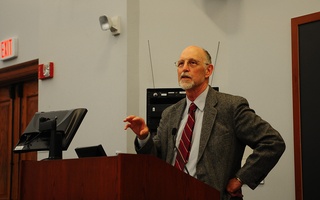In the days after Harvard announced sweeping, University-wide changes to its sexual assault policies and resolution procedures, student leaders and activists said that while the approve of many of the policy’s changes, they are dismayed that they did not establish a more expansive definition of sexual assault.
The changes included the creation of a new university-wide Office of Sexual and Gender-Based Dispute Resolution to investigate sexual assault allegations and a “preponderance of the evidence” standard to investigate them. The policy uses a standard of “unwelcome conduct of a sexual nature” to define sexual harassment, rather than a standard of affirmative consent, as some of Harvard’s peer institutions use.
Undergraduate Council President Gus A. Mayopoulos ’15 called the newly announced policies a “step in the right direction” in an interview on July 3, but criticized their failure to include an affirmative consent requirement.
Affirmative consent is a standard that requires both partners to actively communicate their willingness to participate in sexual activity. The Undergraduate Council voted to endorse such a clause in November 2012.
“I really do think that having [an affirmative consent] policy is an important step to changing culture on campus—to making affirmative consent a social norm,” UC vice president Sietse K. Goffard ’15 added, arguing that such a policy on campus would work to prevent sexual assault, rather than just react to it.
Jessica R. Fournier ’17, an incoming leader of the student advocacy group Our Harvard Can Do Better, which has vocally argued for reform of Harvard’s sexual assault policies, said she applauds the changes the University has made to the complaint process by creating a new investigative office with a more standardized and streamlined process.
However, like the UC leaders, she said that she is still concerned by the use of a standard of “welcomeness and unwelcomeness” to define consent in cases of sexual assault.
“[The new standard is] very vague and dilutes the sense...that they are very specific acts of violence and power and determination,” Fournier said. “A policy of affirmative of consent will allow survivors to better understand their own circumstances...and define what happened to them.”
Fournier argued that the new “unwelcome conduct” standard is ambiguous and that an affirmative consent standard would be more clearly defined.
For Fournier, an affirmative consent clause would “make communication paramount,” prevent those incapacitated from giving consent, and not equate a longstanding relationship to consent.
Mia Karvonides, Harvard’s Title IX officer who will play a central role in implementing the new policies, said July 2 in a question-and-answer with the Harvard Gazette—a publication of Harvard’s communications office—that the new policies do not include an affirmative consent policy because “there is no standard definition of affirmative consent.”
“The closest any college comes to a defined affirmative-consent approach is Antioch College,” Karvonides said. “Under their policy, consent is given step by step at every point of engagement during an intimate encounter. You must verbally ask and verbally get an answer for every point of engagement. ‘May I kiss you? May I undo your blouse?’ Etc.”
Still, other universities, such as Yale and Dartmouth, have adopted sexual assault policies that include affirmative consent clauses, with varying definitions.
Mayopoulos and Goffard said that Karvonides’s defense of the decision not to adopt an affirmative consent policy was unsatisfactory.
“There is no perfect, one accepted standard, but the fact is that there should be … a Harvard definition that is most suitable to our campus,” Goffard added.
Recommended Articles
-
Association Football TomorrowFall practice for both the University and Freshman association football teams will commence on Soldiers Field tomorrow afternoon at 3
-
Revise the PolicyWhen (or, more realistically given a certain level of apathy to the UC on campus, if) you vote for your Undergraduate Council President sometime between today and Friday, you’ll also have the option of asking Harvard to examine its policies on sexual assault.
-
 Karvonides Responds to Concerns about New Sexual Assault Policy
Karvonides Responds to Concerns about New Sexual Assault Policy -
Yes to "Yes Means Yes"The law is the first in the nation to officially embrace an affirmative consent policy, and we hope others are soon to come.
-
 University Committee Considers Adopting Affirmative Consent Standard for Title IX Policy
University Committee Considers Adopting Affirmative Consent Standard for Title IX Policy













